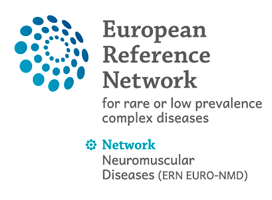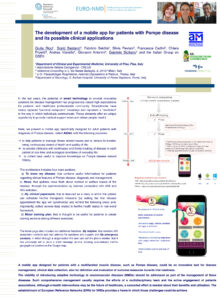30 Nov 2017
The development of a mobile app for patients with Pompe disease and its possible clinical applications
Authors:
Giulia Ricci (g_ricci@alice.it), Giulia Ricci1, Sigrid Baldanzi1, Fabrizio Seidita2, Silvia Peviani3, Francesca Carlini3, Chiara Proietti3, Andrea Vianello4, Giovanni Antonini4, Gabriele Siciliano1 and the Italian Group on GSDII.
1Department of Clinical and Experimental Medicine, University of Pisa, Pisa, Italy
2 Associazione Italiana Glicogenosi – ONLUS
3 Vidiemme Consulting s.r.l, Via Natale Battaglia, 8, 20127 Milan, Italy
4 U.O. Fisiopatologia Respiratoria, Azienda Ospedaliera di Padova, Padua, Italy
5Department of Neurology, S. Andrea Hospital, University of Rome Sapienza, Rome, Italy
The potential of e-health to provide innovative solutions for disease management has raised high expectations by patients’ and healthcare professionals community.
Pompe disease, or glycogen storage disease type II, is an inherited lysosomal storage muscle disorder caused by a deficiency of the enzyme acid alpha-glucosidase (GAA). Since 2006, the enzyme replacement therapy (ERT) with alglucosidase alfa (Genzyme, Cambridge, MA, USA) has been available, improving overall survival. However, a multidisciplinary approach to care remains a crucial factor to determine the overall impact of the disease and clinical outcome.
Here we present an easy and intuitive app for iOS, Android and Windows smartphones, specifically designed for adult patients with Pompe disease, with the following purposes: to help patients to manage illness related issues and to reduce its burden; to provide clinicians with continuous and timely tracking of disease in each patient at real-time and ecological conditions of everyday life; to collect data useful to improve knowledge on Pompe disease natural history.
AIGkit could became a ground-breaking clinical tool yo provide an additional approach for disease management and clinical data collection, in a patient-centered perspective.
Although e-health interventions may be the future of healthcare, a concerted effort is needed about their benefits and utilization. The establishment of European Reference Networks (ERN) for rare diseases (RD), provides a frame in which those challenges could be achieved.


